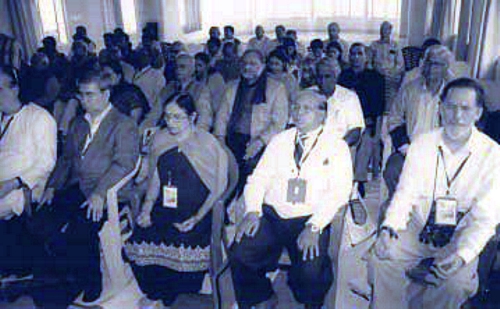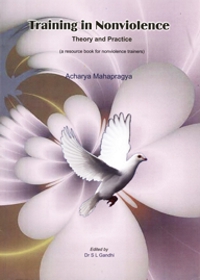So many people are sitting in front of me. And I am saying it because I am able to see them. What I can see is the bodies. In order to keep the body going artha (money or wealth) is necessary. Without money it does not last. Money should not mean merely currency, which may help to acquire a particular thing. Money is that which enables one to achieve a purpose. A diary, a piece of cloth, a microphone, a chair - all are money, they are all currency. So let us accept the first principle that life cannot survive without money. Life survives only when one has artha (money) and can use it.
Since life does not survive without money, the value of money became primary and the value of life became secondary. Consequently money became a necessity. Expectation turned into indispensability and it created a certain viewpoint, a viewpoint of attachment. Then money became more valuable and life became less valuable and today’s problem is precisely this - that life’s value is less than money’s value. Therefore people call money their prana (life force), even maha prana (great life force). A thing having more monetary value attracts more attention. Man does not worry as much for his life as he does for money. The result is that life has become secondary; consciousness has become secondary, while money and consumption have become primary.
We have been left with only two alternatives: money and its utilization, which is not essential for the maintenance of the body. But since it has become the basis of our attachment, it has become much more essential. Therefore, we should study the whole economic system while studying money. Today money has developed a whole system. We have divided it into two parts - consumption of money, and attachment to money before its actual use. Consumption and attachment have been separated. We will not be able to solve the present economic problem until we understand the economic system.
At the very sight of money, man’s nervous system becomes active. Changes occur in it. Neuroscience has become a branch of science. So we have neuroeconomics and neuro-science. Neuro-economics has become a separate branch. A new branch of studying the changes in the nervous system at the sight of money has come into being. It tells us about the activity of the nervous system when it faces money. We come to know which new connections of the neurons of the brain have been formed and which ones have disappeared. Mankind knows such complex things these days.
So let us accept the inevitability of getting money. The nervous system begins to function differently whether it is a question of consuming money or getting money or accumulating money. Therefore we should deliberate on the question of money from a scientific-cum-spiritual point of view.
Money creates such an impact on a man that it drives him to madness, arrogance and violence. This entire subject is being studied in neuro-economics and neuro-science. After acquiring money a man’s way of thinking changes. He leads an ordinary or normal life as long as he does not have much money - ordinary food, clothes and style of living. But on acquiring wealth a new awareness gives rise to an action, which requires satisfying the senses, feeding the heart and the ego. A new awakening takes place and the way of thinking undergoes a change. A boy told his father to give him a rupee. “What will you do?” Asked the father. “I will buy a lottery ticket”, replied the boy. The father added, “Suppose you get a hundred thousand rupees through the lottery what will you do then?” The boy replied, “Respected father, do not worry. I’ll return the rupee given to me by you.” Neuro-economics and neuro-psychology fully study the ways of thinking. They study what thoughts come to a man at such moments and how his thinking changes. It is very important to know what changes in a man and how money affects him.
Let me narrate an incident to you. A labourer invested some money in a lottery and won five hundred thousand rupees. The officials thought that he was a mere labourer and a poor person who has won five hundred thousand rupees. If they broke the news to him, his heart would fail. What should they do then? A doctor was also sharing their thoughts. He said, “Hand the case over to me and I’ll set it right.” He was given the responsibility asked for. The doctor found out the address of the labourer and started walking to and fro in front of it. The labourer asked him what the matter was and whether there was some work to do. The doctor said that there was nothing. Then the labourer invited him to go into his house and said that he should sit and rest there and drink a cup of tea with him. They sat down together. A poor man is more compassionate and honest. On the other hand a rich man is heartless. A poor man is full of kindness and compassion, but everything comes to an end once he acquires wealth.
They started talking. During the talk the doctor asked the labourer, “What will you do if you come to have ten thousand rupees?” The latter said, “Why are you joking. How can I get ten thousand rupees? If I do get it half of the amount I will share with you.” The conversation went on. The amount was increased to one hundred thousand first and two hundred thousand later. “What will you do if you get two hundred thousand” - the doctor asked? “Half of it will be yours. I am a laboure and will never go back on words” - he replied. The amount further increased to four hundred thousand first and five hundred thousand later. “What will you do if you get five hundred thousand,” the doctor asked. The labourer repeated, “One half will be yours and the other half mine.” The doctor said, “Are you sure half of it will be mine?” Yes, surely, he replied. As soon as the doctor heard it, his heart failed. He had gone to treat the labourer psychologically but ended up with heart failure.
It means we should think about the effect wealth has on a person and in that context we should consider present-day problems. It may be heart disease or some other disease, but the fact is that because of attachment to wealth people’s health is deteriorating today while diseases - be they physical, mental or most critically emotional - are on the rise.
Let us therefore think over the big problems of today for which words like corruption etc. are in vogue. At their root lie earning wealth, its consumption and accumulation. These are the main causes responsible for all our ills. Even the method of earning money is not good. Just one individual earns money to such a great extent that it multiplies into billions. Then we will have to admit that Gangotri (origin of the Ganges) can be pure but the flow of the Ganges cannot be pure for no one knows how many pollutants, including chemicals, get mixed with its water as it flows. It is indeed what is happening today. When the means are not pure, when Gangotri is not pure, how will its water be pure? It is said that big people are involved in corruption and are indulging in evil deeds. Why not, since very essence is impure? There is a purpose of living but that is also not pure. When life becomes secondary and wealth becomes primary, how can evil deeds be avoided? These problems would not have arisen only if we had given priority to life, consciousness, restraint, control of senses and victory over them. But we are not doing it. We are giving priority only to earning and accumulating money, then, why will it not happen? We should not be surprised at all.
Some people come and say that a particular man occupies such a big position and yet he does wrong things. I tell them that it does not surprise me. On the contrary I will be surprised if he does not indulge in evil practices. One should not be surprised at people practising corruption under the present circumstances. When money is accumulated, consumption increases proportionately.
There was a common saying in Rajasthan. If a person was asked ‘how are you’ he used to reply, “By God’s grace I am getting enough dal (lentils) and roti (bread) to live on”. But today it is not dal and roti, we must use some other words. Big persons do not eat these things now. They only eat diamonds, emeralds, rubies and currency. They never eat dal roti (lentils and bread) which they think is a poor man’s diet. But what can they do? Nature has so made them that they would die if they were to eat them. Since they cannot eat them, they are available in the world, otherwise big people would have made them disappear. Therefore we should deliberate upon these basic problems.
When Acharya Tulsi started the Anuvrat Movement, he deliberated on these basic problems as to how one can behave morally while earning money. One of the vows was, “I will not behave immorally.” The second was about the restraint on accumulation - “I will not acquire more than this.” This used to be a resolution both of a Jain layman or upasak and of one who accepted the code of Anuvrat. Once Jaiprakash Narayan, an eminent Gandhian leader of India, visited, and we talked together for three consecutive days in Mumbai to lay down the limit of individual ownership but we couldn’t arrive at any conclusion. In the end it appears that society does not agree on restraining or limiting consumption: “I will not consume more than this.” An atmosphere of nonviolence can be built and a problem can be solved if three things are adopted: pure means of earning money, morality and a limit to the acquisition of money. We will have to go into the depth of all these topics while deliberating during training in nonviolence.
Keeping in mind all these things it is necessary for people working in this area that they find out a solution of the problem by thinking deeply about the economics of violence and that of nonviolence during the period of training in nonviolence and even after that.

Nonviolence trainees in a meditative posture
 Acharya Mahaprajna
Acharya Mahaprajna

